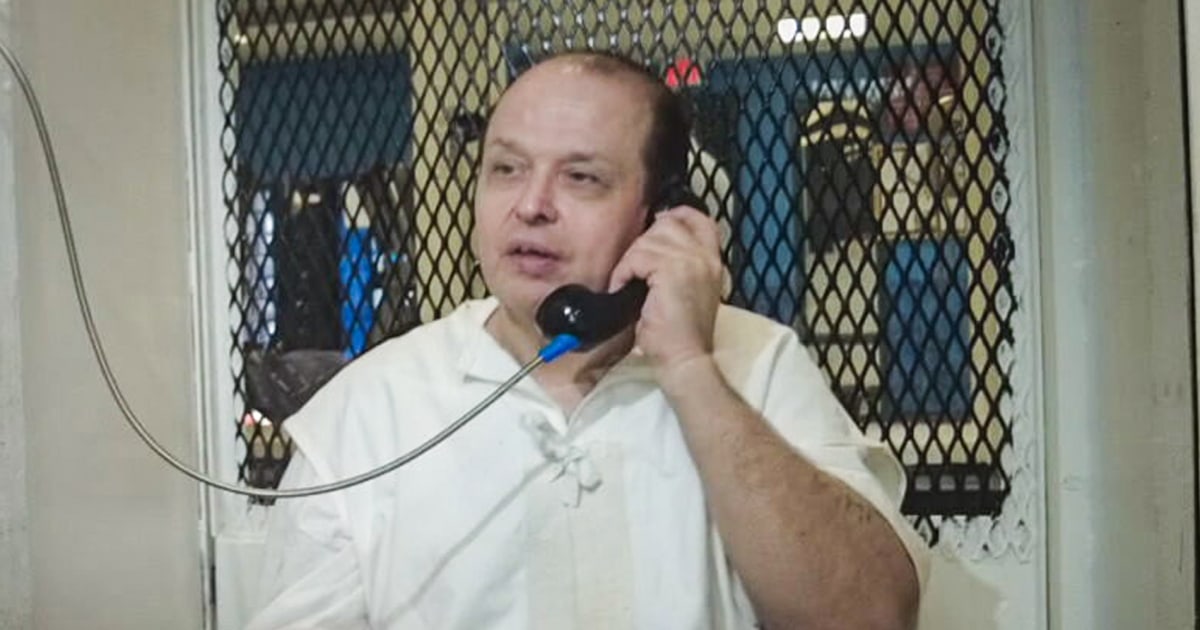A Texas board on Wednesday rejected recommending clemency for a condemned man who would be the first in the nation to be executed for a case of “shaken baby syndrome.”
Robert Roberson, 57, is scheduled to die by lethal injection Thursday after losing a string of appeals, including on Tuesday when a district court judge declined to vacate his execution warrant. The Texas Court of Criminal Appeals on Wednesday also refused another request to halt his execution, as it had done last week.
Roberson’s fate would have been in the hands of Gov. Greg Abbott, who has the power to commute a death sentence if the Texas Board of Pardons and Paroles recommends doing so. Abbott can still grant a one-time 30-day reprieve to postpone the execution even though the board has denied a clemency bid. The U.S. Supreme Court can also block an execution at the final hour, something it rarely does.
The board’s decision came as a committee of Texas lawmakers met Wednesday to hear testimony about Roberson’s case and discuss how a state law that allows for a review of convictions based on so-called junk science could be invoked to delay his execution until the end of the 2025 legislative session.
In an interview from prison this month with NBC News anchor Lester Holt, Roberson urged Abbott to pardon him in the 2002 death of his 2-year-old daughter and “let me go home.”
“I would like the public to know that I’m innocent,” Roberson said. “I’m not guilty of this.”
With his execution looming, Roberson’s case serves as a flashpoint in the ongoing debate over shaken baby syndrome and the broader implications of outdated medical science in criminal convictions.
He has steadfastly maintained his innocence in Nikki’s death, after doctors and law enforcement quickly decided she was killed as a result of a violent shaking episode.
Prosecutors argued that Nikki must have been shaken to death because she had been diagnosed with “the triad” — a swollen and bleeding brain, and retinal hemorrhaging — symptoms once believed to be indisputable evidence of shaken baby syndrome.
However, in the years since Roberson’s conviction in 2003, the science behind the triad being a sole diagnosis of abuse has come under intense scrutiny.
In 2009, the American Academy of Pediatrics changed the name of shaken baby syndrome to the more broadly defined “abusive head trauma” to include injuries caused by mechanisms other than shaking alone.
It is now accepted medical consensus that the symptoms associated with shaken baby syndrome can also be caused by other medical conditions, including infections, accidental trauma and a pre-existing illness.
The uncertainty surrounding shaken baby syndrome has also led to a reevaluation of many criminal cases. Since 1992, at least 34 people in the United States have had their convictions vacated where allegations of shaken baby syndrome or abusive head trauma was a factor, according to the National Registry of Exonerations, which tracks sentences for wrongful convictions.
In January 2002, Roberson said he and Nikki fell asleep in their East Texas home, and he later awoke after hearing a sound and found that she had fallen out of bed, according to court documents.
Later that morning, when Roberson discovered his daughter was unconscious and her lips were blue, he rushed her to a local emergency room. Roberson showed little emotion at the hospital, which furthered law enforcement’s suspicions.
Within a day, a detective with the Palestine Police Department arrested Roberson on a capital murder charge.
The jury in Roberson’s trial never heard the extent of how sick Nikki was from the day she was born nor that she’d been to the hospital more than 40 times in her short life. Two days before Nikki died, she registered a 104.5-degree fever at the doctor’s office. The toddler was sent home with a medication that has since been deemed too dangerous for children — a drug that now carries a “black box warning” from the Food and Drug Administration.
Brian Wharton, the detective who arrested Roberson, now believes he made a grave mistake and that Roberson is innocent.
Wharton, who has since retired, said in a recent interview with Holt that he arrested Roberson without knowledge of Nikki’s medical history and was unaware that Roberson is autistic, which would have explained his lack of emotion. (Roberson was only diagnosed with autism spectrum disorder in 2018.)
Texas nearly executed Roberson in 2016, but the process was halted days before so that another evidentiary hearing could be held. Ultimately, his bid for a new trial was rejected last year.
Roberson’s lawyer, Gretchen Sween, said the case has garnered significant support, including from dozens of distinguished scientists and doctors, a bipartisan group of Texas legislators, advocates for parental rights and organizations that support people with autism.
Read the full article here
